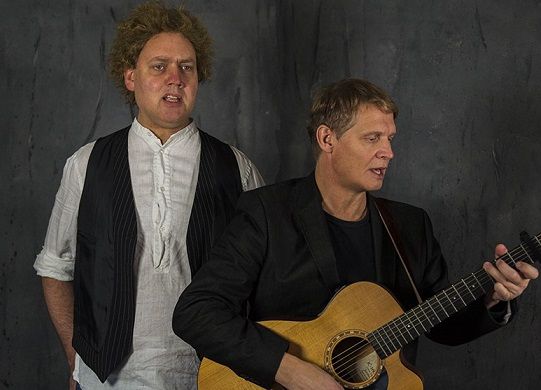Walking into Bremen Teater, I was confident I would be watching a uniquely American play on Simon and Garfunkel’s rollercoaster ride through the music industry. To be frank, I was expecting an English-language play. But Peter Aude’s ‘Bridge Over Troubled Water’ is veritably Danish – in its humour, in its execution and, of course, in its language. And as a non-Danish speaker, I loved every minute of it.
A relaxed viewing experience
Despite the initial shock and frustration at the foreign tongue, one’s inhibitions surrounding the uptight and often overbearing feeling of the theatre all begin to melt away, letting the focus shift to the pure performative nature of the art. Instead of trying to follow every word or plotline, I kept my gaze fixed on the static feet and straight spine of Nis Pedersen’s Art Garfunkel, and the fluttering tip-toe of Morten Lützhøft’s Paul Simon across the intimate stage.
I gave into the flow and direction of the two-man performance, letting the sparse dressing room setting pull me giddily through Simon & Garfunkel’s golden years only to be crushed by their inevitable split. Though the story was nothing new to fans of the duo, the anthological exploration of their five albums in the context of the Vietnam War, the Hippie Movement and the ubiquity of drug use amongst artists gave new meaning to each song.
Reminiscing without replicating
Though I at no point felt like I was at a Simon & Garfunkel concert, I was moved by the music, as both Lützhøft’s dynamism and Pedersen’s boom brought their own unique touches into the play. It felt, quite appropriately, like they weren’t trying to be the infamous musicians. Instead they were performing the songs to set the mood of the era and to immerse the audience into the conflict of 1960s America.
I cannot stress how refreshing an experience foreign-language theatre is. The accompaniment of recognisable and superbly executed music was certainly a plus, but the ambiguity of the dialogue and plot made for a more enriching and heart-wrenching journey. I encourage you to try it out, and why not in the chic digs of Bremen Teater? Step outside your lingual comfort zone and let the show sweep you away.















